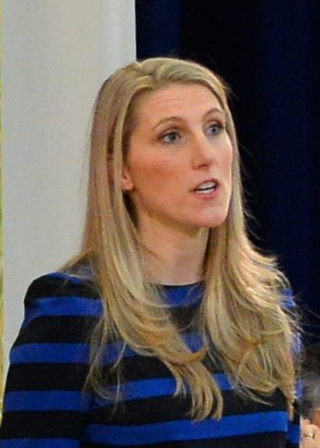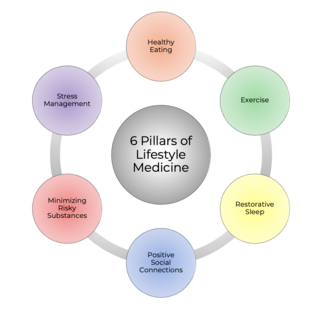
Veterinary medicine is the branch of medicine that deals with the prevention, management, diagnosis, and treatment of disease, disorder, and injury in non-human animals. The scope of veterinary medicine is wide, covering all animal species, both domesticated and wild, with a wide range of conditions that can affect different species.
A health system, health care system or healthcare system is an organization of people, institutions, and resources that delivers health care services to meet the health needs of target populations.
Health has a variety of definitions, which have been used for different purposes over time. In general, it refers to physical and emotional well-being, especially that associated with normal functioning of the human body, absent of disease, pain, or injury.
Medical anthropology studies "human health and disease, health care systems, and biocultural adaptation". It views humans from multidimensional and ecological perspectives. It is one of the most highly developed areas of anthropology and applied anthropology, and is a subfield of social and cultural anthropology that examines the ways in which culture and society are organized around or influenced by issues of health, health care and related issues.

Public health is "the science and art of preventing disease, prolonging life and promoting health through the organized efforts and informed choices of society, organizations, public and private, communities and individuals". Analyzing the determinants of health of a population and the threats it faces is the basis for public health. The public can be as small as a handful of people or as large as a village or an entire city; in the case of a pandemic it may encompass several continents. The concept of health takes into account physical, psychological, and social well-being, among other factors.

Vanessa Bradford Kerry is an American physician, public health expert, and advocate. She is a founder of the non-profit Seed Global Health, director of the Program in Global Public Policy and Social Change at Harvard Medical School, and serves as the Special Envoy for Climate Change and Health for the World Health Organization (WHO).
A public health journal is a scientific journal devoted to the field of public health, including epidemiology, biostatistics, and health care. Public health journals, like most scientific journals, are peer-reviewed. Public health journals are commonly published by health organizations and societies, such as the Bulletin of the World Health Organization or the Journal of Epidemiology and Community Health. Many others are published by a handful of large publishing corporations that includes Elsevier, Wolters Kluwer, Wiley-Blackwell, Springer Science+Business Media, and Informa, each of which has many imprints. Many societies partner with such corporations to handle the work of producing their journals.

James Jude Orbinski is a Canadian physician, humanitarian activist, author, and scholar in global health. Dr. Orbinski began his role as principal of Massey College at the University of Toronto in the 2024-2025 academic year, where he is also Full Professor in the Department of Family and Community Medicine in the Temerty Faculty of Medicine, and is cross-appointed to the Munk School of Global Affairs and Public Policy, as well as the Dalla Lana School of Public Health,. Previously a professor in the Faculty of Health Science at York University, Dr. Orbinski founded the Dahdaleh Institute of Global Health Research.

The American College of Physicians (ACP) is a Philadelphia-based national organization of internal medicine physicians, who specialize in the diagnosis, treatment, and care of adults. With 161,000 members, ACP is the largest medical-specialty organization and second-largest physician group in the United States. Its flagship journal, the Annals of Internal Medicine, is among the most widely cited peer-reviewed medical journals in the world.

"Rice University's Baker Institute for Public Policy", also known as the "Baker Institute", is an American think tank housed on the campus of Rice University in Houston, Texas. Founded in 1993, it functions as a center for public policy research. It is named for James A. Baker, III, former United States Secretary of State, Secretary of the Treasury, and White House Chief of Staff. It is directed by Ambassador David M. Satterfield and funded mainly by donor contributions, endowments, and research grants.
Health law is a field of law that encompasses federal, state, and local law, rules, regulations and other jurisprudence among providers, payers and vendors to the health care industry and its patients, and delivery of health care services, with an emphasis on operations, regulatory and transactional issues.

Social medicine is an interdisciplinary field that focuses on the profound interplay between socio-economic factors and individual health outcomes. Rooted in the challenges of the Industrial Revolution, it seeks to:
- Understand how specific social, economic, and environmental conditions directly impact health, disease, and the delivery of medical care.
- Promote conditions and interventions that address these determinants, aiming for a healthier and more equitable society.

Health policy can be defined as the "decisions, plans, and actions that are undertaken to achieve specific healthcare goals within a society". According to the World Health Organization, a clear health policy can achieve several things: it defines a vision for the future, outlines the priorities and expected roles of different groups, builds consensus, and informs people.
The healthcare reform in China refers to the previous and ongoing healthcare system transition in modern China. China's government, specifically the National Health and Family Planning Commission, plays a leading role in these reforms. Reforms focus on establishing public medical insurance systems and enhancing public healthcare providers, the main component in China's healthcare system. In urban and rural areas, three government medical insurance systems—Urban Residents Basic Medical Insurance, Urban Employee Basic Medical Insurance, and the New Rural Co-operative Medical Scheme—cover almost everyone. Various public healthcare facilities, including county or city hospitals, community health centers, and township health centers, were founded to serve diverse needs. Current and future reforms are outlined in Healthy China 2030.

Hinari Access to Research for Health Programme was set up by the World Health Organization and major publishers to enable developing countries to access collections of biomedical and health literature. There are up to 15,000 e-journals and up to 60,000 online books available to health institutions in more than 10 countries. Hinari is part of Research4Life, the collective name for five programs - Hinari, AGORA, OARE, ARDI and GOALI. Together, Research4Life provides lower income countries with free or low cost access to academic and professional peer-reviewed content online.
The Joseph L. Mailman School of Public Health is the public health graduate school of Columbia University. Located on the Columbia University Irving Medical Center campus in the Washington Heights neighborhood of Manhattan, New York City, the school is accredited by the Council on Education for Public Health.

Lifestyle medicine (LM) is a branch of medicine focused on preventive healthcare and self-care dealing with prevention, research, education, and treatment of disorders caused by lifestyle factors and preventable causes of death such as nutrition, physical inactivity, chronic stress, and self-destructive behaviors including the consumption of tobacco products and drug or alcohol abuse. The goal of LM is to improve individuals' health and wellbeing by applying the 6 pillars of lifestyle medicine (nutrition, regular physical activity, restorative sleep, stress management, avoidance of risky substances, and positive social connection) to prevent chronic conditions such as cardiovascular diseases, diabetes, metabolic syndrome and obesity.
The Journal of Global Drug Policy and Practice describes itself as an open access peer-reviewed public health journal. Critics say it is biased, not peer-reviewed, and not a legitimate scientific journal. It is funded by the US Department of Justice.

The Academy of Family Physicians of India (AFPI) is a professional academic society and non-profit organization in India that was founded in 2010. It was established to promote the development of family medicine and primary healthcare in the country.

Health politics or politics of health is an interdisciplinary field of study concerned with the analysis of social and political power over the health status of individuals.











